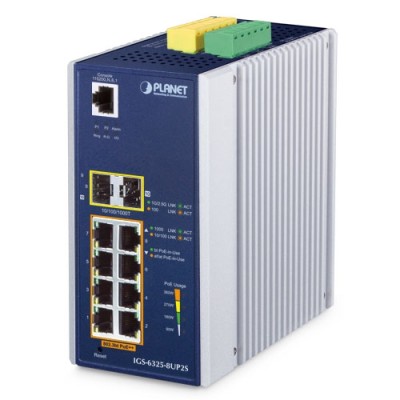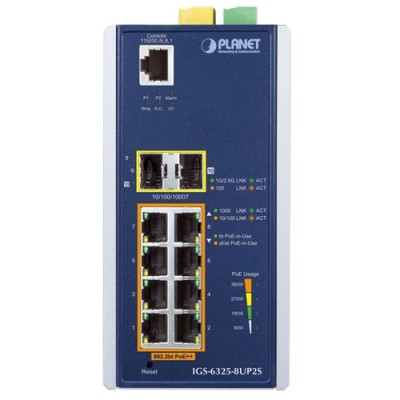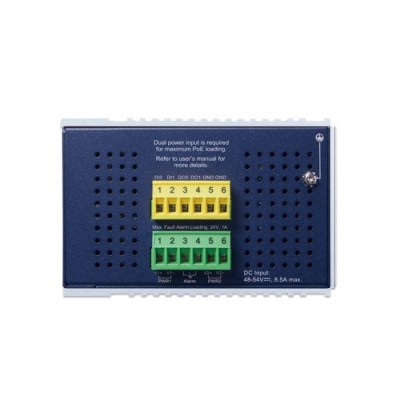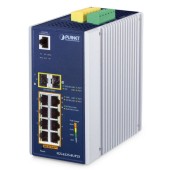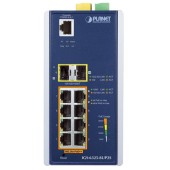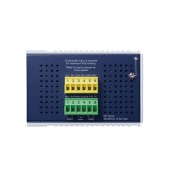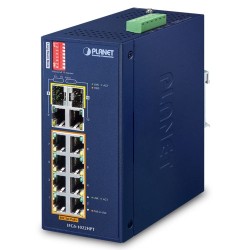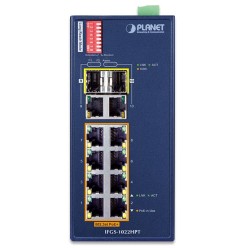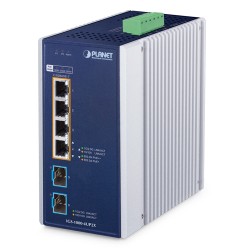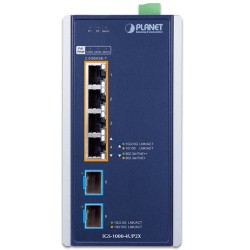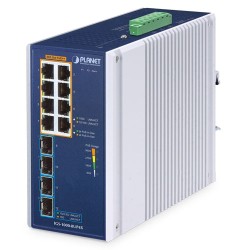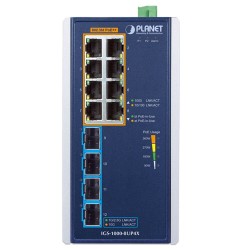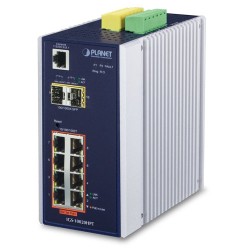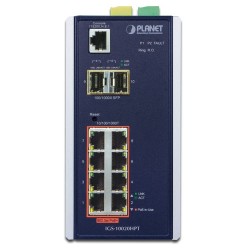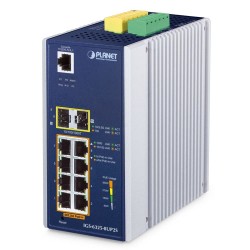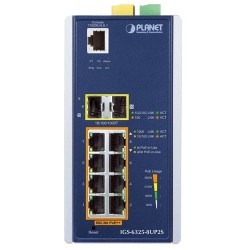- Stock: In Stock
- Brand: PLANET
- Model: IGS-6325-8UP2S
- Weight: 1.75kg
- Dimensions: 10.73cm x 7.68cm x 15.20cm
Outstanding 802.3bt PoE++ Solution for Hardened Environment
Complying with the IEEE 802.3bt Power over Ethernet Plus Plus technology, PLANET IGS-6325-8UP2S L3 Industrial Managed PoE++ Switch features eight 10/100/1000BASE-T 802.3bt PoE++ ports with each port powering up to 95 watts and two 100/1000/2500BASE-X SFP interfaces in a rugged IP30 metal case for stable operation in heavy industrial environments. It supports rich PoE operation modes including 95-watt 802.3bt type-4 PoE++ ports, legacy PoE mode and 4-pair force mode to solve the incompatibility of non-standard 4-pair PoE PDs in the field.
Being able to operate under wide temperature range from -40 to 75 degrees C, the IGS-6325 PoE++ Switch series can be placed in almost any difficult environment. The IGS-6325 PoE++ Switch series also allows either DIN rail or wall mounting for efficient use of cabinet space.
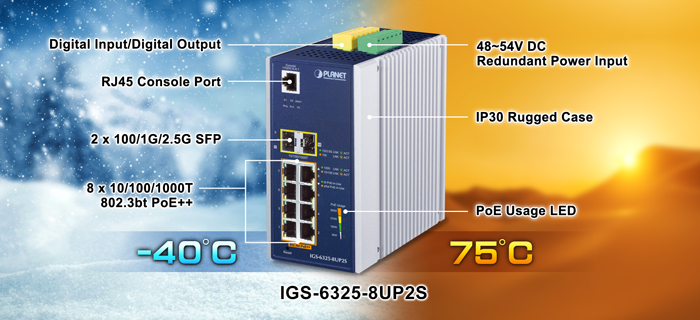
802.3bt PoE++ – 90~95-watt Power over 4-pair UTP Solution
As the IGS-6325 PoE++ Series adopts the IEEE 802.bt PoE++ standard, it is capable to source up to 95 watts of power by using all the four pairs of standard Cat5e/6 Ethernet cabling to deliver power and full-speed data to each remote PoE compliant powered device (PD). It possesses triple amount of power capability than the conventional 802.3at PoE+ and is an ideal solution to satisfy the growing demand for higher power consuming network PDs, such as:
- PoE PTZ speed dome cameras
- Any network device that needs higher PoE power to work normally
- Thin clients
- AIO (all-in-one) touch PCs, point of sale (POS) and information kiosks
- Remote digital signage displays
- PoE lightings
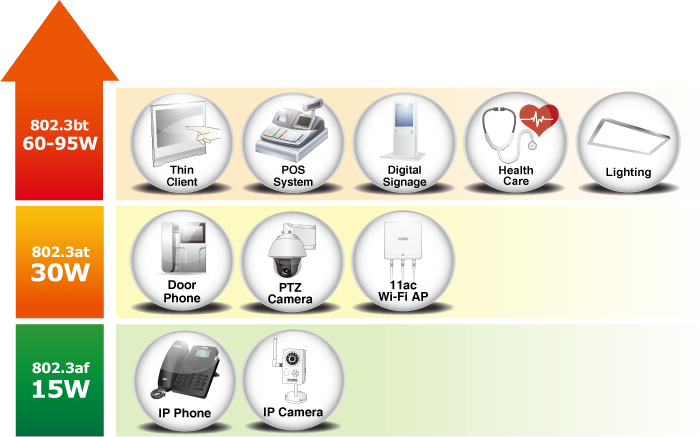
802.3bt PoE++ and Advanced PoE Power Output Mode Management
To meet the demand of various powered devices consuming stable PoE power, the IGS-6325 PoE++ Switch series provides five different PoE power output modes for selection.
- 95W 802.3bt PoE++ Power Output Mode
- 95W UPOE/Legacy Power Output Mode
- 95W Force Power Output Mode
- 36W End-span PoE Power Output Mode (Pins 1, 2, 3, 6)
- 36W Mid-span PoE Power Output Mode (Pins 4, 5, 7, 8)
Convenient and Smart ONVIF Devices with Detection Feature
PLANET has newly developed an awesome feature -- ONVIF Support -- which is specifically designed for co-operating with video IP surveillances. From the IGS-6325 PoE++ Switch series GUI, clients just need one click to search and show all of the ONVIF devices via network application.
In addition, clients can upload floor plans to the switch, allowing to locate surveillance devices for easier inspection and planning. Moreover, clients can get real-time surveillance’s information and online/offline status, and also allows cameras PoE reboot control from GUI.
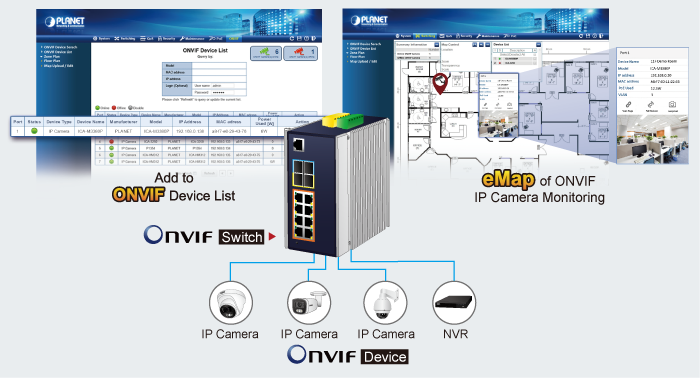
Built-in Unique PoE Functions for Powered Devices Management
Being the managed PoE switches for surveillance, wireless and VoIP networks, the IGS-6325 PoE++ Switch series features the following special PoE management functions:
- PD alive check
- Scheduled power recycling
- PoE schedule
- PoE usage monitoring
Intelligent Alive Check for Powered Device
The IGS-6325 PoE++ Series can be configured to monitor connected PD’s status in real time via ping action. Once the PD stops working and responding, the IGS-6325 PoE++ Series will recycle the PoE port power and bring the PD back to work. It also greatly enhances the reliability in that the PoE port will reset the PD power, thus reducing administrator’s management burden.
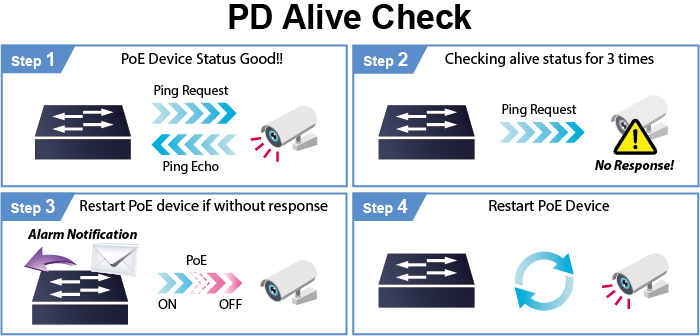
PoE Schedule for Energy Savings
Under the trend of energy savings worldwide and contributing to environmental protection on the Earth, the IGS-6325 PoE++ Series can effectively control the power supply besides its capability of giving high watts power. The built-in “PoE schedule” function helps you to enable or disable PoE power feeding for each PoE port during specified time intervals and it is a powerful function to help SMBs or enterprises save power and money.
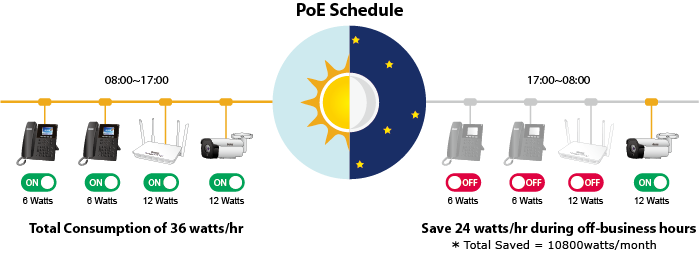
Scheduled Power Recycling
The IGS-6325 PoE++ Series allows each of the connected PoE IP cameras or PoE wireless access points to reboot at a specific time each week. Therefore, it will reduce the chance of IP camera or AP crash resulting from buffer overflow.
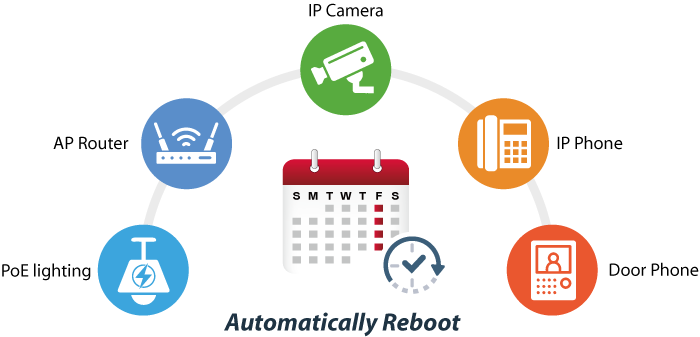
PoE Usage Monitoring
Via the power usage chart in the web management interface, the IGS-6325 PoE++ Series enables the administrator to monitor the status of the power usage of the connected PDs in real time. Thus, it greatly enhances the management efficiency of the facilities.
Layer 3 Network Routing Support
The IGS-6325 PoE++ Series allows administrators to boost network efficiency by configuring Layer 3 IPv4/IPv6 VLAN static routing manually or automatically through the Routing Information Protocol (RIP) or Open Shortest Path First (OSPF) settings.
- The RIP uses hop count as a routing metric and prevents routing loops by setting a limit on the number of hops allowed in a path from source to destination.
- The OSPF is an interior dynamic routing protocol for autonomous systems based on link state. The protocol creates a database of link states by exchanging link states among Layer 3 switches and then uses the Shortest Path First algorithm to generate a route table based on that database.
Redundant Ring, Fast Recovery for Critical Network Applications
The IGS-6325 PoE++ Series supports redundant ring technology and features strong, rapid self-recovery capability to prevent interruptions and external intrusions. It incorporates advanced ITU-T G.8032 ERPS (Ethernet Ring Protection Switching) technology, Spanning Tree Protocol (802.1s MSTP), and redundant power input system into customer’s industrial automation network to enhance system reliability and uptime in harsh factory environments. In a certain simple Ring network, the recovery time of data link can be as fast as 10ms.
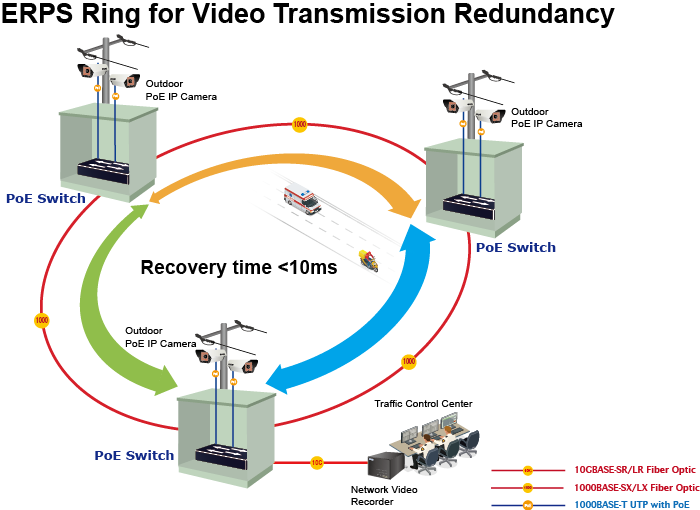
Cybersecurity Network Solution to Minimize Security Risks
The IGS-6325 PoE++ Series comes with enhanced cybersecurity to fend off cyber threats and cyber attacks. It supports SSHv2 and TLSv1.2 protocols to provide strong protection against advanced threats. Served as a key point to transmit data to customer's critical equipment in a business network, the cybersecurity feature of the IGS-6325 PoE++ Series protects the switch management and enhances the security of the mission-critical network without any extra deployment cost and effort.
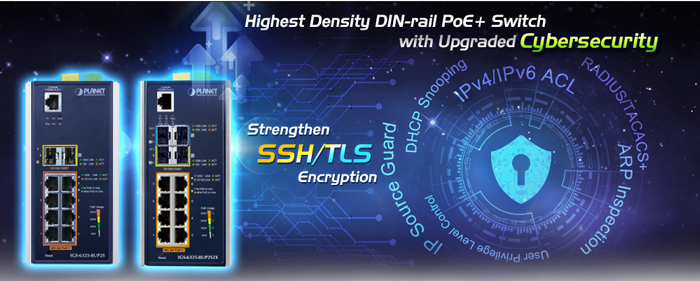
Modbus TCP Provides Flexible Network Connectivity for Factory Automation
With the supported Modbus TCP/IP protocol, the IGS-6325 PoE++ Series can easily integrate with SCADA systems, HMI systems and other data acquisition systems in factory floors. It enables administrators to remotely monitor the industrial Ethernet switch’s operating information, port information, communication status, and DI and DO status, thus easily achieving enhanced monitoring and maintenance of the entire factory.
1588 Time Protocol for Industrial Computing Networks
The IGS-6325 PoE++ Series is ideal for telecom and Carrier Ethernet applications, supporting MEF service delivery and timing over packet solutions for IEEE 1588 and synchronous Ethernet.
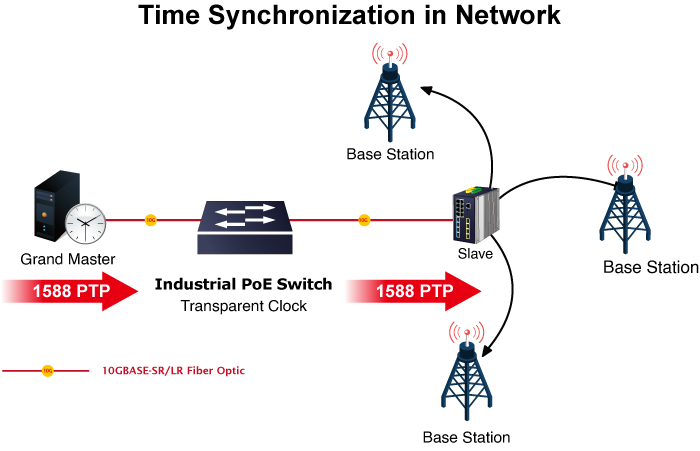 SMTP/SNMP Trap Event Alert
SMTP/SNMP Trap Event Alert
The IGS-6325 PoE++ Series provides event alert function to help to diagnose the abnormal device owing to whether or not there is a break of the network connection, or the rebooting response.
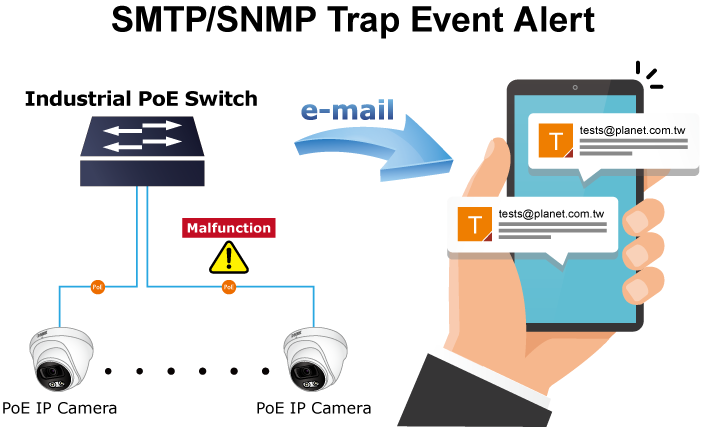
Effective Alarm Alert for Better Protection
The IGS-6325 PoE++ Series supports a Fault Alarm feature which can alert the users when there is something wrong with the switches. With this ideal feature, the users would not have to waste time finding where the problem is. It will help to save time and human resource.
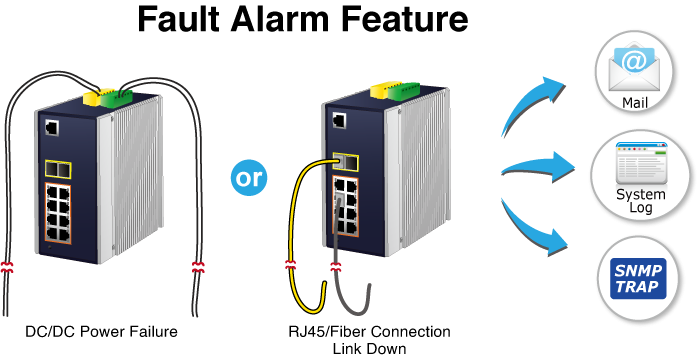
Digital Input and Digital Output for External Alarm
The IGS-6325 PoE++ Series supports Digital Input and Digital Output on its front panel. This external alarm enables users to use Digital Input to detect and log external device status (such as door intrusion detector), and send event alarm to the administrators. The Digital Output could be used to alarm the administrators if the I IGS-6325 PoE++ Series’ port shows link down, link up or power failure.
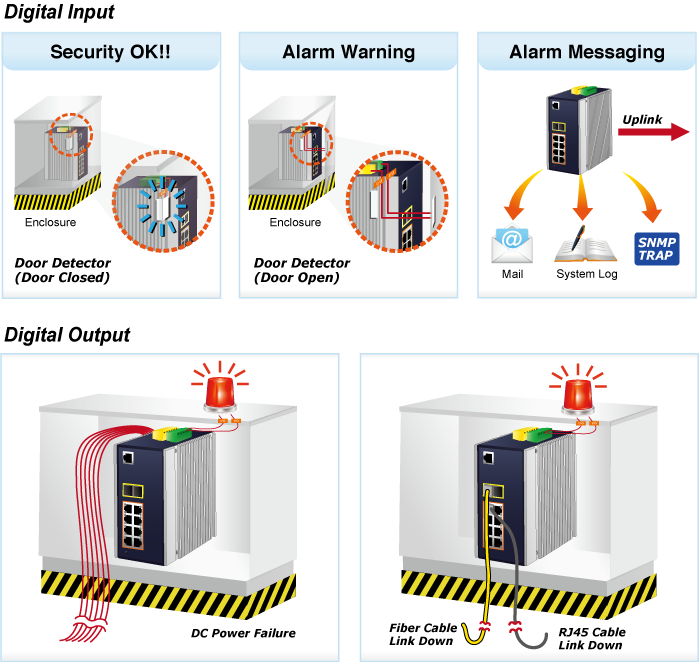
Robust Layer 2 to Layer 4 Features
The IGS-6325 PoE++ Series can be programmed for advanced Layer 2 switch management functions such as dynamic port link aggregation, 802.1Q tagged VLAN, Q-in-Q VLAN, private VLAN, Multiple Spanning Tree Protocol (MSTP), Layer 2 to Layer 4 QoS, bandwidth control, IGMP snooping and MLD snooping. Via the aggregation of supporting ports, the IGS-6325 PoE++ Series allows the operation of a high-speed trunk group that comes with multiple ports and supports fail-over as well.

Efficient Management
For efficient management, the IGS-6325 PoE++ Series is equipped with console, Web and SNMP management interfaces.
- With the built-in Web-based management interface, it offers an easy-to-use, platform-independent management and configuration facility.
- For text-based management, it can be accessed via Telnet and the console port.
- For standard-based monitor and management software, it offers SNMPv3 connection which encrypts the packet content at each session for secure remote management.

Remote Management Solution
PLANET's Universal Network Management System (UNI-NMS) and CloudViewer app support IT staff by remotely managing all network devices and monitoring PDs' operational statuses. Thus, they're designed for both the enterprises and industries where deployments of PDs can be as remote as possible, without having to go to the actual location once a bug or faulty condition is found. With the UNI-NMS or CloudViewerPro app, all kinds of businesses can now be speedily and efficiently managed from one platform.
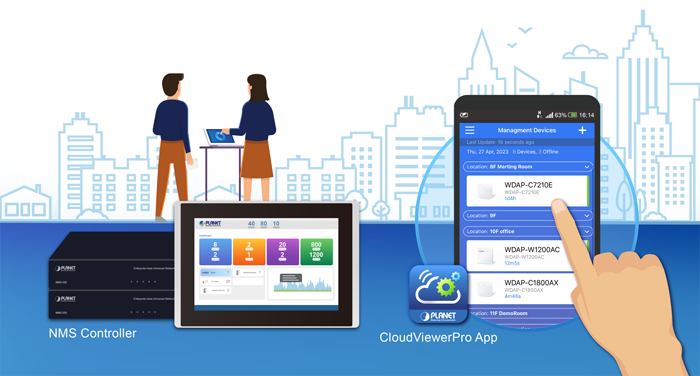
Powerful Network Security
The IGS-6325 PoE++ Series offers comprehensive Layer 2 to Layer 4 Access Control List (ACL) for enforcing security to the edge. It can be used to restrict network access by denying packets based on source and destination IP address, TCP/UDP ports or defined typical network applications. Its protection mechanism also comprises 802.1X Port-based and MAC-based user and device authentication. With the private VLAN function, communication between edge ports can be prevented to ensure user privacy.
Advanced IP Network Protection
The IGS-6325 PoE++ Series also provides DHCP Snooping, IP Source Guard and Dynamic ARP Inspection functions to prevent IP snooping from attack and discard ARP packets with invalid MAC address. The network administrators can now construct highly-secure corporate networks with considerably less time and effort than before.
Flexible and Extendable Fiber Optic Ethernet Solution
With its additional 2-port 1000BASE-SX/LX SFP or 2500BASE-X SFP fiber optic Ethernet link capability, the administrator now can flexibly choose the suitable SFP transceiver according to the transmission distance or the transmission speed required to extend the network efficiently. The IGS-6325 PoE++ Series provides broad bandwidth and powerful processing capacity.
Intelligent SFP Diagnosis Mechanism
The IGS-6325 PoE++ Series supports SFP-DDM (digital diagnostic monitor) function that greatly helps network administrator to easily monitor real-time parameters of the SFP transceivers, such as optical output power, optical input power, temperature, laser bias current, and transceiver supply voltage.
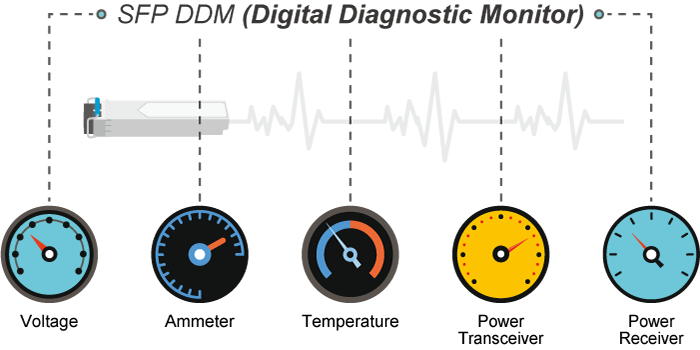
Industrial Area Department/Workgroup PoE Switch
Providing up to eight 802.3bt PoE++, in-line power interfaces, the IGS-6325 PoE++ Series can easily build a power centrally controlled for IP phone system, IP camera system, or wireless AP group for Industrial network. For instance, eight PoE IP cameras or wireless access points can be easily installed around the corner in the industrial environment for surveillance demands or for a wireless roaming network. Without the power-socket limitation, the IGS-6325 PoE++ Series makes the installation of IP cameras or wireless AP easier and more efficient.
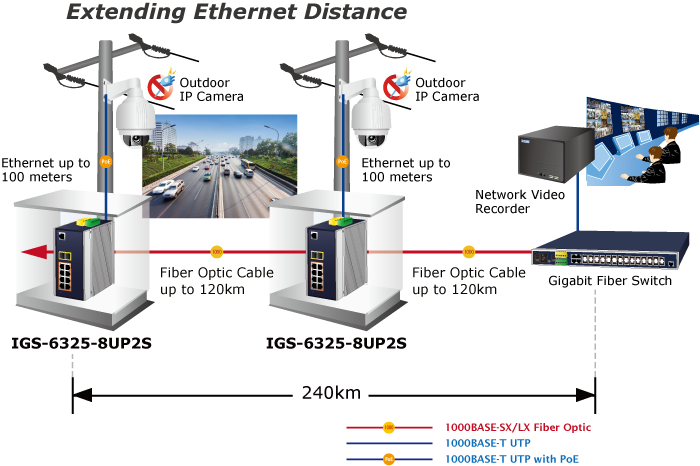
Gigabit 802.3bt PoE++ and PoE+ Network Deployment
To control the power system of your networking devices, the IGS-6325 PoE++ Series can directly co-work with network devices such as PoE IP phone to build VoIP network in the office. The 802.3bt PoE++ switch can be directly connected to any third-party IEEE 802.3af/802.3at/802.3bt compliant devices installed within 100 meters. Furthermore, the IGS-6325 PoE++ can extend much longer distance by using PLANET PoE extender for powering up the PoE PD which can be installed over more than 100 meters away.
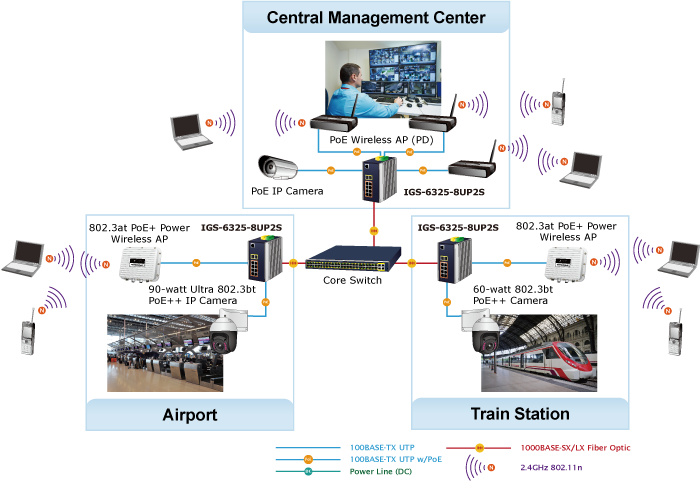
Physical Port
- 8 10/100/1000BASE-T Gigabit Ethernet RJ45 ports with 802.3bt PoE++ Injector function
- 2 100/1000/2500BASE-X SFP slots for SFP type auto detection, compatible with 2.5GBASE-X SFP
- One RJ45-to-RS232 console interface for basic management and setup
802.3bt Power over Ethernet
- Complies with IEEE 802.3bt Power over Ethernet Plus Plus Type-4 PSE
- Backward compatible with IEEE 802.3at/af PD device
- Up to 8 ports of IEEE 802.3af/IEEE 802.3at/IEEE 802.3bt PoE++ devices powered
- Supports PoE power up to 95 watts for each PoE port
- Total of 360-watt PoE budget
- Auto detects powered device (PD)
- Circuit protection prevents power interference between ports
- Remote power feeding up to 100m
- PoE management features
- Total PoE power budget control
- Per port PoE function enable/disable
- PoE admin-mode control
- PoE port power feeding priority
- Per PoE port power limit
- PD classification detection
- PoE extend mode control to support power feeding up to a distance of up to 200 meters
- Intelligent PoE features
- Temperature threshold control
- PoE usage threshold control
- PD alive check
- PoE schedule
Industrial Protocol
- Modbus TCP for real-time monitoring in the SCADA system
- IEEE 1588v2 PTP (Precision Time Protocol) transparent clock mode
Industrial Hardened Design
- Dual power input, redundant power with reverse polarity protection
- DC 48 to 54V input
- Active-active redundant power failure protection
- Backup of catastrophic power failure on one supply
- Fault tolerance and resilience
- DIN-rail or and wall-mountable designs
- IP30 aluminum case
- Supports 6000V Ethernet ESD protection
- -40 to 75 degrees C operating temperature
Digital Input and Digital Output
- 2 Digital Input (DI)
- 2 Digital Output (DO)
- Integrate sensors into auto alarm system
- Transfer alarm to IP network via email and SNMP trap
Layer 3 IP Routing Features
- IP dynamic routing protocol supports RIP, OSPFv2 and OSPFv3
- Supports maximum 128 static routes and route summarization
- IPv4 dynamic routing protocol supports OSPFv2
- IPv4/IPv6 hardware static routing
- Routing interface provides per VLAN routing mode
Layer 2 Features
- Prevents packet loss with back pressure (half-duplex) and IEEE 802.3x pause frame flow control (full-duplex)
- High performance of Store-and-Forward architecture, and runt/CRC filtering eliminates erroneous packets to optimize the network bandwidth
- Storm Control support
- Broadcast/Multicast/Unicast
- Supports VLAN
- IEEE 802.1Q tagged VLAN
- Up to 4K VLANs groups, out of 4095 VLAN IDs
- Supports provider bridging (VLAN Q-in-Q IEEE 802.1ad)
- Private VLAN Edge (PVE)
- Protocol-based VLAN
- MAC-based VLAN
- Voice VLAN
- GVRP (GARP VLAN Registration Protocol)
- Supports Spanning Tree Protocol
- IEEE 802.1D Spanning Tree Protocol (STP)
- IEEE 802.1w Rapid Spanning Tree Protocol (RSTP)
- IEEE 802.1s Multiple Spanning Tree Protocol (MSTP), spanning tree by VLAN
- BPDU Guard
- Supports Link Aggregation
- 802.3ad Link Aggregation Control Protocol (LACP)
- Cisco ether-channel (static trunk)
- Maximum 4 trunk groups with 4 ports per trunk group
- Up to 40Gbps bandwidth (duplex mode)
- Provides port mirror (many-to-1)
- Port mirroring to monitor the incoming or outgoing traffic on a particular port
- Loop protection to avoid broadcast loops
- Link Layer Discovery Protocol (LLDP)
- Compatible with Cisco uni-directional link detection(UDLD) that monitors a link between two switches and blocks the ports on both ends of the link if the link fails at any point between the two devices
- Supports G.8032 ERPS (Ethernet Ring Protection Switching)
- IEEE 1588 and Synchronous Ethernet network timing
Quality of Service
- Ingress Shaper and Egress Rate Limit per port bandwidth control
- 8 priority queues on all switch ports
- Traffic classification
- IEEE 802.1p CoS
- IP TOS/DSCP/IP precedence
- IP TCP/UDP port number
- Typical network application
- Strict priority and Weighted Round Robin (WRR) CoS policies
- Supports QoS and In/Out bandwidth control on each port
- Traffic-policing on the switch port
- DSCP remarking
Multicast
- Supports IPv4 IGMP snooping v1, v2 and v3
- Supports IPv6 MLD snooping v1 and v2
- Querier mode support
- IPv4 IGMP snooping port filtering
- IPv6 MLD snooping port filtering
- MVR (Multicast VLAN Registration)
Security
- Authentication
- IEEE 802.1X Port-based/MAC-based network access authentication
- Built-in RADIUS client to cooperate with the RADIUS servers
- TACACS+ login users access authentication
- RADIUS/TACACS+ users access authentication
- Guest VLAN assigns clients to a restricted VLAN with limited services.
- Access Control Lit
- IP-based Access Control List (ACL)
- MAC-based Access Control List
- Source MAC/IP address binding
- DHCP snooping to filter distrusted DHCP messages
- Dynamic ARP Inspection discards ARP packets with invalid MAC address to IP address binding
- IP Source Guard prevents IP spoofing attacks
- IP address access management to prevent unauthorized intruder
Management
- IPv4 and IPv6 dual stack management
- Switch Management Interfaces
- Console and Telnet Command Line Interface
- HTTP web switch management
- SNMP v1 and v2c switch management
- SSHv2, TLSv1.2 and SNMP v3 secure access
- SNMP Management
- Four RMON groups (history, statistics, alarms, and events)
- SNMP trap for interface Link Up and Link Down notification
- IPv6 IP address/NTP/DNS management
- Built-in Trivial File Transfer Protocol (TFTP) client
- BOOTP and DHCP for IP address assignment
- System Maintenance
- Firmware upload/download via HTTP
- Reset button for system reboot or reset to factory default
- Dual images
- DHCP Relay
- DHCP Option 82
- DHCP Server
- User Privilege levels control
- Network Time Protocol (NTP)
- Network Diagnostic
- SFP-DDM (Digital Diagnostic Monitor)
- Cable diagnostic technology provides the mechanism to detect and report potential cabling issues
- ICMPv6/ICMPv4 remote ping
- SMTP/Syslog remote alarm
- System Log
- PLANET UNI-NMS (Universal Network Management) and CloudViewer app for deployment management
- Provides ONVIF for cooperating with PLANET IP video surveillance
| Hardware Specifications | |
|---|---|
| Copper Ports | 8 10/100/1000BASE-T RJ45 auto-MDI/MDI-X ports |
| SFP Ports | 2 1000BASE-SX/LX/BX SFP slot interfaces (Port-9 and Port-10) Compatible with 100BASE-FX and 2500BASE-X SFP |
| SFP+ Ports | N/A |
| PoE Injector Ports | 8 ports with 802.3bt PoE++ injector function with Port-1 to Port-8 |
| Console | 1 x RJ45-to-RS232 serial port (115200, 8, N, 1) |
| Reset Button | < 5 sec: System reboot > 5 sec: Factory default |
| Connector | Removable 6-pin terminal block for power input Pin 1/2 for Power 1, Pin 3/4 for fault alarm, Pin 5/6 for Power 2 Removable 6-pin terminal block for DI/DO interface Pin 1/2 for DI 1 & 2, Pin 3/4 for DO 1 & 2, Pin 5/6 for GND |
| Alarm | One relay output for power failure. Alarm relay current carry ability: 1A @ 24V DC |
| Digital Input (DO) | 2 digital input: Level 0: -24~2.1V (±0.1V) Level 1: 2.1~24V (±0.1V) Input load to 24V DC, 10mA max. |
| Digital Output (DO) | 2 digital output: Open collector to 24VDC, 100mA |
| Installation | DIN-rail or wall mounting |
| Enclosure | IP30 aluminum case |
| Dimensions (W x D x H) | 86 x 107.3 x 152 mm |
| Weight | 1,278 g |
| Power Requirements | Dual DC 48~54V, 8.5A max. (>52V DC for 802.3bt PoE++ output recommended) |
| Power Consumption | Max. 11.93 watts/40.71 BTU@ dual 54V DC input (System on) Max. 381.5 watts/1301.73 BTU@ dual 54V DC input (Full loading with 802.3bt PoE++ function) |
| ESD Protection | Air 8KV DC Contact 6KV DC |
| Surge Protection | 4KV DC |
| LED Indicator | System: Power 1 (Green), Power 2 (Green) Fault Alarm (Red) Ring (Green), Ring Owner (Green) DIDO (Red) Per 10/100/1000T RJ45 PoE++ Port: 1000Mbps LNK/ACT (Green) 10/100Mbps LNK/ACT (Amber) 802.3bt PoE++-in-use x 1 (Green) 802.3at/af PoE-in-use x 1 (Amber) Per SFP Interface: 1000/2500 LNK/ACT (Green) 100 LNK/ACT (Amber) PoE Usage: 90W, 180W, 270W, 360W (Amber) |
| Switching Specifications | |
| Switch Architecture | Store-and-Forward |
| Switch Fabric | 56Gbps/non-blocking |
| Throughput (packet per second) | 41.67Mpps@ 64 bytes packet |
| Address Table | 16K entries, automatic source address learning and aging |
| Shared Data Buffer | 32Mbits |
| Flow Control | IEEE 802.3x pause frame for full-duplex Back pressure for half-duplex |
| Jumbo Frame | 10Kbytes |
| Power Over Ethernet | |
| PoE Standard | IEEE 802.3bt PoE++ Type-4 PSE Backward compatible with 802.3at PoE+ PSE |
| PoE Power Supply Type | 802.3bt End-span Mid-span |
| PoE Power Output | Per port 48V ~ 54VDC 802.3bt Type-4 mode: maximum 95 watts Legacy mode: maximum 95 watts Force mode: maximum 95 watts End-span mode: maximum 36 watts Mid-span mode: maximum 36 watts |
| Power Pin Assignment | End-span: 1/2(-), 3/6(+) Mid-span: 4/5(+), 7/8(-) 802.3bt/UPoE: 1/2(-), 3/6(+),4/5(+), 7/8(-) |
| PoE Power Budget | Single power input: 240W maximum (depending on power input) Dual power input: 360W maximum (depending on power input) ※Dual power input must be the same as DC voltage, like dual 54V. |
| PoE Ability PD @ 12.5 watts | 8 units |
| PoE Ability PD @ 25 watts | 8 units |
| PoE Ability PD @ 51 watts | 6 units |
| PoE Ability PD @ 71 watts | 4 units |
| PoE Management Functions | |
| PoE System Management | PoE Port status monitoring Total PoE power budget control PoE usage threshold and temperature threshold |
| Enhanced PoE Mode | Standard/Legacy/Force |
| PoE Device Live Detection | Per port remote PD IP address 4 actions None PD reboot PR reboot and alarm Alarm |
| PoE Power Recycling | Daily or predefined schedule |
| PoE Schedule | 4 schedule profiles |
| PoE Extend Mode | Max. 200 meters |
| Layer 3 Functions | |
| IP Interfaces | Max. 128 VLAN interfaces |
| Routing Table | Max. 128 routing entries Max. 4K H/W routing table entries |
| Routing Protocols | IPv4 RIPv1/v2 IPv4 OSPFv2 IPv4 hardware static routing IPv6 OSPFv3 IPv6 hardware static routing |
| Layer 2 Functions | |
| Port Configuration | Port disable/enable Auto-negotiation 10/100/1000Mbps full and half duplex mode selection Flow control disable/enable Port link capability control |
| Port Status | Display each port’s speed duplex mode, link status, flow control status, auto negotiation status, trunk status |
| Port Mirroring | TX/RX/both Many-to-1 monitor RMirror – Remote Switched Port Analyzer (Cisco RSPAN) Supports up to 5 sessions |
| VLAN | IEEE 802.1Q tag-based VLAN IEEE 802.1ad Q-in-Q tunneling Private VLAN Edge (PVE) MAC-based VLAN Protocol-based VLAN Voice VLAN MVR (Multicast VLAN Registration) GVRP (GARP VLAN Registration Protocol) Up to 4K VLAN groups, out of 4096 VLAN IDs |
| Spanning Tree Protocol | IEEE 802.1D Spanning Tree Protocol IEEE 802.1w Rapid Spanning Tree Protocol IEEE 802.1s Multiple Spanning Tree Protocol BPDU Guard |
| Link Aggregation | IEEE 802.3ad LACP/static trunk Supports 6 trunk groups with 4 ports per trunk group |
| IGMP Snooping | IPv4 IGMP (v1/v2/v3) snooping IPv4 IGMP querier mode support IPv4 IGMP Snooping port filtering Supports 255 IGMP groups |
| MLD Snooping | IPv6 MLD (v1/v2) snooping, IPv6 MLD querier mode support Supports 255 MLD groups |
| Ring | Supports ERPS, and complies with ITU-T G.8032 Recovery time < 10ms @ 3 nodes Recovery time <50ms @ 16 nodes Supports major ring and sub-ring |
| Synchronization | IEEE 1588v2 PTP (Precision Time Protocol) Peer-to-peer transparent clock End-to-end transparent clock |
| QoS | Traffic classification based, strict priority and WRR 8-level priority for switching Port number 802.1p priority 802.1Q VLAN tag DSCP/TOS field in IP packet |
| Bandwidth Control | Per port bandwidth control Ingress: 500Kb~1000Mbps Egress: 500Kb~1000Mbps |
| Security Functions | |
| Access Control List | IP-based ACL/MAC-based ACL ACL based on: MAC Address IP Address Ethertype Protocol Type VLAN ID DSCP 802.1p Priority Up to 512 entries |
| Security | Port security IP source guard, up to 512 entries Dynamic ARP inspection, up to 1K entries Command line authority control based on user level Static MAC address, up to 64 entries |
| AAA | RADIUS client TACACS+ client |
| Network Access Control | IEEE 802.1x port-based network access control MAC-based authentication Local/RADIUS authentication |
| Management | |
| Basic Management Interfaces | Console; Telnet; Web browser; SNMP v1, v2c |
| Secure Management Interfaces | SSHv1/SSHv2, TLS1.2, SNMP v3 |
| System Management | Firmware upgrade by HTTP protocol through Ethernet network Configuration upload/download through HTTP Remote syslog System log LLDP protocol NTP PLANET Smart Discovery Utility PLANET CloudViewer app |
| Event Management | Remote syslog System log SMTP |
| ONVIF | ONVIF device discovery ONVIF device monitoring Floor map |
| SNMP MIBs | RFC 1213 MIB-II RFC 1493 Bridge MIB RFC 1643 Ethernet MIB RFC 2863 Interface MIB RFC 2665 Ether-Like MIB RFC 2819 RMON MIB (Group 1, 2, 3 and 9) RFC 2737 Entity MIB RFC 2618 RADIUS Client MIB RFC 2863 IF-MIB RFC 2933 IGMP-STD-MIB RFC 3411 SNMP-Frameworks-MIB RFC 4292 IP Forward MIB RFC 4293 IP MIB RFC 4836 MAU-MIB IEEE 802.1X PAE LLDP MAU-MIB |
| Standards Conformance | |
| Regulatory Compliance | FCC Part 15 Class A, CE |
| Stability Testing | IEC60068-2-32 (free fall) IEC60068-2-27 (shock) IEC60068-2-6 (vibration) |
| Standards Compliance | IEEE 802.3 10BASE-T IEEE 802.3u 100BASE-TX/100BASE-FX IEEE 802.3z Gigabit SX/LX IEEE 802.3ab Gigabit 1000T IEEE 802.3x flow control and back pressure IEEE 802.3ad port trunk with LACP IEEE 802.1D Spanning Tree Protocol IEEE 802.1w Rapid Spanning Tree Protocol IEEE 802.1s Multiple Spanning Tree Protocol IEEE 802.1p Class of Service IEEE 802.1Q VLAN tagging IEEE 802.1ad Q-in-Q VLAN stacking IEEE 802.1X Port Authentication Network Control IEEE 802.1ab LLDP IEEE 802.3af Power over Ethernet IEEE 802.3at Power over Ethernet Plus IEEE 802.3bt Power over Ethernet Plus Plus IEEE 802.3ah OAM IEEE 802.1ag Connectivity Fault Management (CFM) IEEE 802.3az Energy Efficient Ethernet (EEE) IEEE 1588 PTPv2 RFC 768 UDP RFC 783 TFTP RFC 791 IP RFC 792 ICMP RFC 2068 HTTP RFC 1058 RIP v1 RFC 2453 RIP v2 RFC 1112 IGMP v1 RFC 2236 IGMP v2 RFC 3376 IGMP v3 RFC 2710 MLD v1 FRC 3810 MLD v2 RFC 2328 OSPF v2 RFC 2740 OSPF v3 ITU-T G.8032 ERPS Ring ITU-T Y.1731 Performance Monitoring |
| Environment | |
| Operating | Temperature: -40 ~ 75 degrees C Relative Humidity: 5 ~ 95% (non-condensing) |
| Storage | Temperature: -40 ~ 85 degrees C Relative Humidity: 5 ~ 95% (non-condensing) |
Datasheet
| Date | Version | Description | Download |
|---|---|---|---|
| 2024-06-21 | 2.0 | IGS-6325-8UP2S |
|
Firmware
Quick Guide
| Date | Version | Description | Download |
|---|---|---|---|
| 2024-06-21 | 1.4 | Release for hardware version 2.0. |
|
| 2024-06-21 | 1.5 | [Release for hardware version 2.0.] For PSTI version. |
|
User's Manual
| Date | Version | Description | Download |
|---|---|---|---|
| 2024-06-28 | 1.7 | [Release for hardware version 2.0.] Added PSTI function. |
|
| 2024-06-21 | 1.6 | Release for hardware version 2.0. |
|
EC Declaration
| Date | Version | Description | Download |
|---|---|---|---|
| 2024-06-21 | 2.0 | EC Declaration. |
|

